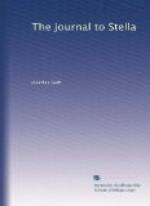18 Esther Johnson lodged opposite St. Mary’s in Dublin.
19 This famous Tory club began with the meeting together of a few extreme Tories at the Bell in Westminster. The password to the Club—“October”—was one easy of remembrance to a country gentleman who loved his ale.
20 “Duke” Disney, “not an old man,
but an old rake,” died in 1731. Gay calls
him “facetious Disney,” and Swift says
that all the members of the Club “love him mightily.”
Lady M. W. Montagu speaks of his
“Broad plump face,
pert eyes, and ruddy skin,
Which showed the
stupid joke which lurked within.”
Disney was a French Huguenot refugee, and his real
name was Desaulnais. He commanded an Irish regiment,
and took part in General Hill’s expedition to
Canada in 1711 (Kingsford’s Canada, ii. 465).
By his will (Wentworth papers, 109) he “left
nothing to his poor relations, but very handsome to
his bottle companions.”
21 There were several Colonel Fieldings in the first half of the eighteenth century, and it is not clear which is the one referred to by Swift. Possibly he was the Edmund Fielding—grandson of the first Earl of Denbigh—who died a Lieutenant-General in 1741, at the age of sixty-three, but is best known as the father of Henry Fielding, the novelist.
22 Cf. Feb. 17, 1711.
23 See Letter 3, note 37.
24 “It is a measured mile round the outer wall; and far beyond any the finest square in London” (Deane Swift).
25 “The common fare for a set-down in Dublin” (ib.).
26 “Mrs. Stoyte lived at Donnybrook, the road to which from Stephen’s Green ran into the country about a mile from the south-east corner” (ib.).
27 “Those words in italics are written in a very large hand, and so is the word large” (ib.). [Italics replaced by capitals for the transcription of this etext.]
28 Deane Swift alters “lele” to “there,” but in a note states how he here altered Swift’s “cypher way of writing.” No doubt “lele” and other favourite words occurred frequently in the Ms., as they do in the later letters.
Letter 17.
1 Sir Thomas Mansel, Bart., Comptroller of the Household to Queen Anne, and a Lord of the Treasury, was raised to the peerage in December 1711 as Baron Mansel of Margam. He died in 1723.
2 Lady Betty Butler and Lady Betty Germaine (see Letter 3, note 40 and Letter 4, note 3).
3 James Eckershall, “second clerk of the Queen’s Privy Kitchen.” Chamberlayne (Magnae Britanniae Notitia, 171O, p. 536) says that his wages were 11 pounds, 8 shillings and a penny-ha’penny, and board-wages 138 pounds, 11 shillings and tenpence-ha’penny, making 150 pounds in all. Afterwards Eckershall was gentleman usher to Queen Anne; he died at Drayton in 1753, aged seventy-four. Pope was in correspondence with him in 172O on the subject of contemplated speculations in South Sea and other stocks.




